| Sendedatum | 2009-02-23 14:38:51 |
|---|---|
| Ausgabe | 83 |
hier eine weitere Ausgabe des beliebten Newsletters für Masochisten und Weltuntergangssekten. Je nach Newsreader kann die Darstellung weniger als perfekt befriedigend sein, daher könnte sich ein Blick auf die Onlineversion lohnen, die außerdem verschlagwortet ist.
Zur Einstimmung hier ein Bild vom kanadischen Ölschieferabbau:
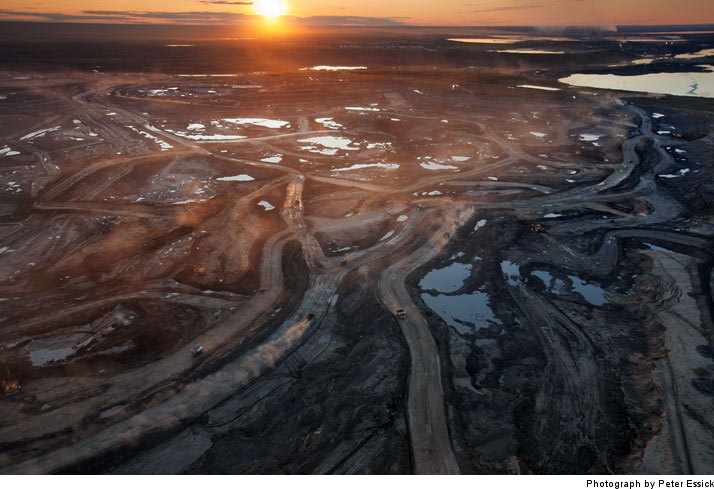
Ob man die Welt wirklich so behandeln muß?
Quelle: National Geographic
Inhaltsverzeichnis:
- Global temperatures for January
- Dubai markets jump on news of loan
- South African Economy Probably Contracted: Week Ahead
- Biofuels boom could destroy rainforests
- U.N. says food production may fall 25 percent by 2050
- The tropics on fire: scientist's grim vision of global warming
- South Asia's largest rivers threatened, warns UN
- Extreme water shortages predicted for tropical Andes
- Ocean Less Effective At Absorbing Carbon Dioxide Emitted By Human Activity
- Living Near Fast Food Ups Stroke Risk
- IMF Rapidly Expanding Its Balance Sheet
- Debtors' prison
- Asian box ports see alarming drop in throughput
- Airbus: Unmögliche Produktionskürzung
- Troops seize £50m of Afghan opium
- US commander: Troops 'stalemated' in Afghanistan
- Beijing's Olympic building boom becomes a bust
- Chinese Firms Turn to Pawn Shops as Loans Dry Up
- Chinas derzeitige Börsenrally
- Citibank has cut all lending in Denmark
- Bund verweigert Hilfe für HSH Nordbank
- Irland: Proteste
- Irish bank workers spat at over financial scandals
- Japan department store sales down 9.1% in January
- Latvian Prime Minister quits of economic crisis
- Pemex’s Cantarell Drops at Fastest Rate in 14 Years
- Nigeria Should Buy Company Shares to Help Market, Lawmaker Says
- Österreichs offensive Banken
- Rußlands Arbeitslosigkeit
- Saab in Insolvenz
- Crisis-hit Serbia seeks 2 bln more dollars from IMF: report
- Biggest developers in Spain start just 135 properties in last quarter of 2008
- IMF agrees $120 million for struggling Tajikistan
- Taiwan GDP slumps 8% as export demand falls
- Ukraine GDP Down 20% In January
- Ukraine droht Staatsbankrott
- UK car production falls 58.7pc
- UK: Importpreise
- Bradford & Bingley verschiebt Zinszahlung
- US/UK Rettungspakete im Verhältnis zum BIP
- Los Angeles nears water rationing
- Texas Ranchers and Farmers Struggle in Drought
- TARP-Linked NASDAQ Government Relief Index: Update
- USA: Architecture Billings Index
- USA Industrieproduktion
Inhalt:
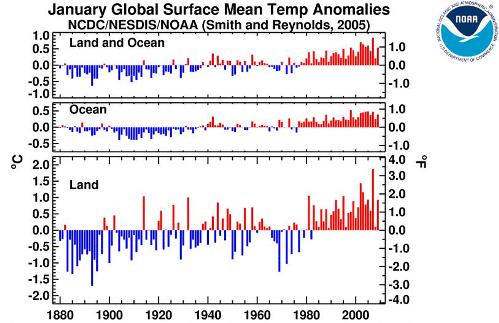
Auch wenn mir im Januar ständig kalt war: dieser Januar war nicht kalt, über die ganze Erde gesehen.
10 Milliarden Dollar? Eine riesige Summe Geld...
die 10 Mrd. sind Teil einer 20 Mrd. Anleihe, damit dürfte die Refinanzierung des Emirats für dieses Jahr gesichert sein - aber andererseits bleiben da gerade mal noch 6 Mrd. Dollar Konjukturprogamme und Rettungspakete.
Gross domestic product fell an annualized 1.5 percent in the final three months of last year compared with the third quarter, according to the median estimate of 20 economists surveyed by Bloomberg. Statistics South Africa will publish the report at 11:30 a.m. in Pretoria tomorrow.
Recessions in the U.S., Europe and Japan, which together buy 60 percent of South African exports, are undermining mining and manufacturing production and adding to job losses in a country where unemployment is 23 percent.
"If we run our cars on biofuels produced in the tropics, chances will be good that we are effectively burning rainforests in our gas tanks," she said. "When trees are cut down to make room for new farmland, they are usually burned, sending their stored carbon to the atmosphere as carbon dioxide. That creates what's called a carbon debt," Gibbs said. "This is because the carbon lost from deforestation is much greater than the carbon saved from using the current-generation biofuels."
The fall-off will strike just as 2 billion more people are added to the world's population, according to the U.N. Environment Program (UNEP), which says cereal yields have stagnated worldwide and fish catches are declining.
25% weniger Nahrung, 33% mehr Menschen, macht daß jeder Mensch im Durchschnitt dann nur noch 60% der heutigen Nahrungsmenge hat. Von beiden Vorhersagen wird nur eine eintreffen.
The report concluded that the Earth's temperature is likely to rise between 1.1C and 6.4C by 2100, depending on future global carbon emissions. "We now have data showing that from 2000 to 2007, greenhouse gas emissions increased far more rapidly than we expected, primarily because developing countries, like China and India, saw a huge upsurge in electric power generation, almost all of it based on coal," Field said. The next report, which Field will oversee, is due in 2014 and will now include future scenarios where global warming is far more serious than previous reports have suggested, he said.
Sogar das IPCC schätzt die mögliche Temperaturänderungen nun zwischen 1.1 und 6.4 Grad ein.
"Regenwälder sind nicht entflammbar. Aber wenn sie nur ein bischen austrocknen, kann es sehr große und zerstörerische Waldbrände geben. Es wird immer klarer, daß viele Wälder, die als Karbonsenken gewirkt haben, sich in Karbonquellen verwandeln können".
Man muß wahrscheinlich Wissenschaftler sein, um einen solchen Umstand bereits 2009 zu entdecken.
The report — jointly released by the UN Environment Programme and the Asian Institute of Technology — studied the Ganges-Brahmaputra-Meghna (GBM), Indus and Helmand river basins, all of which span multiple countries within the region.
[...]
Extreme population growth in the basins over the last century has put pressure on the region's water resources, while around two-thirds of the Himalayan glaciers that feed the basins are receding. Additionally, groundwater levels in the GBM and Indus basins are declining at a rate of two to four metres per year due to intense pumping.
In India alone the amount of water per head has decreased from 4,000 to 1,869 cubic metres in the last twenty years.
[...]
"The per capita availability of freshwater is declining, and contaminated water remains the greatest single environmental cause of human illness and death," he says.
Bangladesh, Indien und Pakistan werden massive Probleme mit der Wasserversorgung bekommen.
Und Afghanistan (Fluß Helmand) ist auch im Boot.
The models predict temperature increases of 2–7 degrees Celsius, depending on location and scenario, for the entire tropical South America region.
Most strongly affected will be the tropical Andes, home to 99 per cent of the world's tropical glaciers. These provide the surrounding region with a steady supply of water, retaining much of the precipitation falling at high elevation and eventually — when the snow melts — releasing it to feed river streams.
Südlicher Indischer Ozean:
Mehr Wind -> mehr CO2 wird von tiefen Meeresschichten nach oben umgeschichtet -> die oberen Schichten können weniger CO2 aufnehmen.
Soviel zum "Mixing the deep water of the ocean"-Teil von Climate scientists: it's time for 'Plan B'.
Höheres Infarktrisiko durch ... Leben nahe Fast Food Tempeln.
The study also showed that each additional fast food restaurant in the neighborhood increased the chance of stroke by 1 percent. The results of the research were presented at the International Stroke Conference in San Diego on Thursday.
Und die Ursache? Nicht sicher, aber vielleicht:
"Among the many ills of fast food is an extremely high sodium content," said Katz, who was not affiliated with the study. "A highly processed fast food meal may provide a full day's sodium requirement, or more.
"Sodium is a contributor to hypertension, hypertension is a contributor to stroke."
Oder es liegt an der Nachbarschaft:
For example, Morgenstern said, such neighborhoods may have fewer parks and green spaces for exercise. They may have a higher level of air pollution -- another determinant of an increased stroke risk. Or they could be poorer areas, with more crime and other stressors that could bump up stroke risk among inhabitants.
Aber was auch immer Ursache und was Wirkung ist: Zu viel Fast Food-Station in der Nähe bedeuten nichts gutes für die Gesundheit.
Über den IWF und seine Aussichten:
Eine weitere Implikation ist die Frage "was passiert eigentlich im Falle von Zahlungsausfällen":
Wer jetzt dem IWF Geld gibt, kann das eigentlich nur mit Geld tun, daß ansonsten wertlos ist...
Der Economist schreibt über Firmenkapital und Schulden, über den Grund warum so viele Firmen lieber kein überschüssiges Eigenkapital aufnehmen und bereit sind, Schulden zu machen, und und und.
Und dabei ist auch dieser Absatz:
That change is not just a reflection of the financial crisis or the recession. The decline in credit ratings has been remorseless over the past couple of decades. In 1987 just 38.1% of issuers in the American bond market were rated as speculative, or “junk”. In 2007 junk-bond issuers made up most of the market for the first time. The number of lowly-rated CCC issuers has almost tripled over the past 21 years.
1980 gab's außerhalb des Finanzsektors 60 für AAA qualifizierte US-Firmen. Heute sind es 6.
1987 waren 38% der Anleihen ausgebenden Firmen "junk", 2007 war mehr als die Hälfte des Anleihenmarktes so.
Mich wundert ja ein bischen, daß trotz der Arbeit der Ratingagenturen so wenig AAA da ist...
Den Containertraffic in Singapur hatte ich ja bereits, aber der Rest ist neu:
Singapur: -19% gegenüber Januar 2008.
Hong Kong: -23%.
Port Klang, Malaysia: -16%.
China, Häfen insgesamt: -15% (-10% ggü. Dezember)
The picture was equally grim for one of Southeast Asia largest exporters with the country’s trade minister Mari Pangestu forecast that its exports could fall by at least 20% this year.
“Based on container flow for January-February, exports volume this year may decline by between 20%-30%. Non-oil and gas exports are expected to fall,” Ms Pangestu said at the weekend.
Nichts definitives, aber die Erwartung von 20-30% weniger Exporten.
Airbus hat ja eine Kürzung der Produktion angekündigt:
Mir kam es leicht optimistisch vor, die Produktion von 44.5 auf 42.5 Maschinen pro Monat zu senken, aber vielleicht ist das ja wegen langfristiger Verträge richtig. Oder so.
Nein, ist es nicht. Es ist ganz anders... Fleetbuzzeditorial hat sich die Zahlen angesehen und ist über eine Ungereimtheit gestolpert.
Airbus eigene Presseerklärung zu den Ergebnissen von 2008 sagt: (Quelle)
Also 32 A320 im Monat und 7 A330/340.
Von 32 A320 im Monat kann man schlecht auf 34 kürzen, und von 7 A330/A340 im Monat kann man die Produktion bei 8.5 pro Monat konstant halten.
Ein klein wenig bedenklich ist es ja schon, wenn so ein Unternehmen keine Ahnung von den eigenen Produktionszahlen hat...
By the time it ended, after five days of rolling combat, opium worth more than £50m had been found hidden behind high walls of |purpose-built factories and storehouses. It was one of the biggest single finds of drugs caches. The operation also highlighted the new role for British troops since Nato’s controversial decision to extend its remit to embrace counter-narcotics. It was a move opposed by many commanders concerned about creating another enemy – disgruntled poppy farmers.
Britische und afghanischen Soldaten haben Opium für 50 Mio. Pfund erbeutet - ungefähr 72 Mio. Dollar.
Angeblich ist das ein Schlag gegen die Finanzierung der Taliban. Das kann man durchaus in Frage stellen.
Vom United Nations Office on Drugs and Crime stammt das Opium Winter Assessment. Und demnach liegt der Kilopreis für Opium um die 90 Dollar. 72 Mio Dollar entsprechen 800 Tonnen.
1295*90 ergibt aber meiner Meinung nach gerade mal so 120000 Dollar, nicht jedoch 72 Mio.
Die Erklärung: Der Straßenpreis für Heroin in Großbritannien ist 40 Pfund pro Gramm (laut dem Telegraph. Wenn Du nun 1295 KG * 1000 * 40 rechnet, bist Du bei? Ja, genau, 52 Mio. Pfund.
Die Herren von der afghanisch/britischen Drogenfahndung haben dem Produzenten Ware weggenommen und Endkundenpreise angesetzt...
Und um die Sache noch etwas genauer zu betrachten: Opium gibt's in naß (wet) und trocken (dry). Naß enthält das Zeug Wasser - und "dry" eben nicht. Deshalb ist dry opium durchaus etwas teurer als wet opium - und die 90$ pro KG ist der "farm gate price" für trockenes Opium.
Laut Afghanistan Opium Survey 2008 ist der zur Erntezeit der Preis für nasses Opium 70 Dollar pro KG, der für trockenes Zeug 95$ (oben genannte 90$ waren der Preis im Dezember). Rechnet man die 1295 KG zu 70$, kommt man sogar nur auf 91000 Dollar.
Oder anders gesagt, bei der ganzen Aktion ist Opium im Wert von unter 120000 Dollar erbeutet worden. Und dafür "five days of rolling combat"? Mit 700 Soldaten? Schon die Lohnkosten für die liegen höher...
Im "Fact Sheet" des Afghanistan Opium Survey 2008 wird geschätzt (geraten?), daß der "Farm Gate" Wert des Opiums in Afghanistan 2008 732 Millionen Dollar gewesen ist - also ziemlich genau das Zehnfache des angegebenen Wertes der jüngsten Beute. Da könnte man den Verdacht bekommen, daß die Briten oder Afghanen oder auch beide einfach mal einen ganz, ganz großen Coup gebraucht haben.
Nur leider, leider war's das einfach nicht.
cultivation resulted in a smaller 6% decrease in potential opium production which is estimated
in 2008 at 7,700 mt. If all the opium were converted into heroin and using a 7:1 ratio as
reported in previous studies, this would amount to 1,100 mt of heroin.
Die potentielle Produktion Afghanistans lag 2008 bei 7700 Tonnen Opium = 1100 Tonnen Heroin. Die 1295 KG sind also 0,17 Prozent der Jahresproduktion. Der große Schlag gegen die Finanzierung der Taliban war das also nicht - und würde in dieser Graphik hier nicht erkennbar sein:

In 2008, cannabis cultivation was reported in 14 provinces namely Badakhshan, Badghis,
Baghlan, Bamyan, Day Kundi, Farah, Hilmand, Kandahar, Khost, Kunduz, Laghman,
Nangarhar, Uruzgan and Zabul. The highest cultivation was reported in Uruzgan, followed by
Kandahar, Hilmand and Nangarhar. The average price of cannabis at the end of July was
USD$ 56/kg.
Cannabis prices have been increasing in the last two years and reached US$ 56/kg in July
2008. Farmers growing cannabis may earn the same net income per hectare as farmers who
grow opium, or even more, because cultivating cannabis is less labour intensive than opium.
Though the opium survey does gather some data on cannabis cultivation, no estimates can be
provided in this preliminary report. It is clear, however, that cultivating cannabis is becoming
increasigly lucrative. When this is considered in conjuction with the fact that all the emphasis
is put on reducing opium, there is a great risk of farmers switching to cannabis.
Auch wenn die Opiumproduktion zurück geht: Möglicherweise wechseln die Farmer einfach zu Cannabis.
Army Gen. David McKiernan also predicted that the bolstered numbers of U.S. soldiers in Afghanistan — about 55,000 in all — will remain near those levels for up to five years.
Still, McKiernan said, that is only about two-thirds of the number of troops he has requested to secure the war-torn nation.
17000 Soldaten mehr ändern laut Ansicht des amerikanischen Kommandanten wenig in Afghanistan - der statt nun 55000 lieber 82000 Soldaten haben wollte.
Ein rein militärischer Sieg ist nicht machbar. Eine späte Einsicht.
Robert H. Scales, a retired Army two-star general who visited southern Afghanistan last October as a military adviser, said in a telephone interview Wednesday that he agrees there is essentially a stalemate in that area, which is a traditional stronghold for the Taliban movement. But he said that does not mean U.S. and allies forces are losing.
Ja, da hat er Recht - und soetwas von Recht...
Zu schade nur, daß die amerikanisch geführte Koalition die Hoffnungen des Landes bereits durch Zerbomben von Hochzeitsgesellschaften und Schafherden enttäuscht hat.
In dieser Deutlichkeit habe ich das noch nirgends gelesen:
Peking 2009: genug leere Büroräume für die nächsten 14 Jahre _hoher Wachstumszahlen_.
The venue, which costs $9 million a year to maintain, is expected to be turned into a shopping mall in several years, its owners announced last month.
Peking 2009: Das Vogelneststadion wird voraussichtlich einmal benutzt werden.
Peking 2009: Ein 2008 geöffnetes Baseball-Stadion wurde einmal benutzt und bereits wieder abgerissen.
Unter den Umständen Sportanlagen zu Einkaufszentren machen zu wollen ist sportlich.
"These are like New York prices, but we are Chinese. We don't have that kind of money," said Zhang Huizhan, a 55-year-old businessman who owns a Chinese furniture factory. He has been looking for five years for an apartment for him and his wife within their budget of $150,000.
The average salary in Beijing is less than $6,000 a year.
Was fällt einem dazu noch ein?
Pfandleihhäuser in China haben Zulauf. Warum? Weil Banken keine Kredite geben.
Turned away by banks caught in the credit crunch, Roger, like many Chinese businessmen, borrows from pawn shops instead. In this case, he paid off the loan a few days later when a customer made payment on a big steel purchase.
[...]
An auto dealer pawned his downtown apartment against a 4 million yuan ($585,000) credit line to secure funds for his business. A real estate developer gave his unsold properties as collateral to get an emergency loan while waiting to secure bank funds. And a construction company owner hocked his villa to get a loan to pay workers' salaries.
[...]
"About 90 percent of small businesses in Shanghai fail to get bank loans," Wang said. "The problem is more severe during a weak economy."
[...]
The Chinese government has eased monetary policy and urged banks to lend, with January lending showing a record pace of growth. Yet most new loans are directed at the country's 4 trillion yuan economic stimulus plan and state-owned companies.
Und das trotz des tollen Stimuluspakets... wovon ich übrigens langsam zu glauben beginne, daß darüber mal Lehrbücher geschrieben werden werden. Es scheint ein Musterbeispiel für "falsch" zu sein.
Aber trotz des Zulaufs sind die Leihhäuser nicht wirklich glücklich:
Chinas Rally gründet auf absolut soliden Fundamentalzahlen. Oder?
Investors opened 427,460 new accounts to trade stocks last week, according to data posted on the Web site of China Securities Depository & Clearing Corp. yesterday, almost double the number in the previous week and the most since the five days to March 28.
[...]
“It’s a rampant practice,” said Xie. “Here you are borrowing at 1.5 percent and the stock market rises, so you put your money into stocks and hope to get out after making 20 percent.”
Oder... denn Aktienkauf auf Pump dank billiger Kredite ist ziemlich unsolides Glücksspiel.
Aber das werden die 600000+ Leute noch lernen, die gerade in die Spielhalle gegangen sind.
Übersetzung aus dem dänischen durch Credit Writedowns: Die Citibank gibt in Dänemark keine Kredite mehr.
We are not offering loans at the moment because of the economic situation.
That is the message when you call to get a Citibank Denmark ‘quick and easy loan.’
The Bank has just closed itself for what banks are best: lending money. And it is still uncertain when Citibank will start lending money again, writes Ekstra Bladet Netsite, eb.dk.
Finn Ostrup who is a professor of Finance at Copenhagen Business School, believes that Citibank Denmark’s American owner, Citigroup, is about to go bankrupt.
“Citigroup would have gone bankrupt in December, unless they had been helped by the U.S. Government.
“They are still threatened with bankruptcy, and I think that is why they will not lend more money,” says Finn Ostrup to Ekstra Bladet.
For Danish Citibank customers bankruptcy could be a hard blow.
“If Citibank terminates loans, they might not be paid back right away,” says Finn Ostrup.
“If that happens, customers may try to obtain money elsewhere. But if Citibank does not have the option of canceling loans, customers will have no problems,” he says.
Ekstra Bladet tried all day to get a comment from the responsible representatives from Citibank, but failed.
Haben Dänen etwa einen besonders schlechten Ruf bezüglich der Rückzahlung von Krediten oder, ich wage es kaum zu schreiben, ist die Citibank am Ende?
Die HSH Nordbank kann vorerst nicht auf Hilfe aus dem staatlichen Finanzmarktfonds Soffin rechnen. Nach einem Gespräch mit dem Vorsitzenden des Soffin-Lenkungsausschusses, Finanzstaatssekretär Axel Nawrath, sagte Hamburgs Finanzsenator Michael Freytag (CDU): "Der Bund besteht darauf, dass die Altlasten der HSH Nordbank von den Anteilseignern selbst getragen werden."
Hamburg und Schleswig-Holstein sind mit jeweils rund 30 Prozent an der Bank beteiligt. Für 2008 hat das Institut ein Minus von 2,8 Milliarden Euro ausgewiesen, nun will es 1100 Stellen streichen. Schleswig-Holsteins Ministerpräsident Peter Harry Carstensen (CDU) sagte nach dem Treffen: "Jetzt geht es darum, zügig und konstruktiv die erforderlichen Entscheidungen herbeizuführen."
Nach Informationen des "Hamburger Abendblatts" hat der Bund im Verlaufe des mehrstündigen Gesprächs damit gedroht, die HSH Nordbank zu schließen, falls beide Länder nicht bis Dienstag das Rettungspaket auf den Weg bringen.
_Eigentlich_ ist das ja eine vernünftige Sache - die Eigentümer, die nicht aufgepaßt haben, was ihre Banken taten, sollen bluten. Zu dumm nur, daß der Eigentümer letztendlich der Staat ist.
HSH Nordbank - das Institut, was noch immer keinen Quartalsbericht für Q3/2008 hat, siehe:
http://www.hsh-nordbank.de/de/investorrelations/konzernberichterstattung/geschftsjahr2008/geschftsjahr2008.jsp - aber am 28.4.2009 kommt der Jahresbericht.
Der Plan der irischen Regierung, die Gehälter der Staatsangestellten durch Abgaben zu reduzieren, und Banken durch den Pensionsfond eben jener Staatsangestellten zu rekapitalisieren, hat nicht viele Freunde gefunden:
Auf Deutschland hochgerechnet wären da 1,3 Mio. auf der Straße gewesen. An Stelle der Regierenden würde mir das Sorgen machen.
Die Krise zeigt merkwürdige Folgen:
The IBOA, which represents over 20,000 workers in Ireland's financial sector, said staff at banks had been facing growing abuse.
"We are seeing this kind of abuse not just in the working day but even socially in the evening," said IBOA general secretary Larry Broderick.
"Many of our members now are saying that they are reluctant to go out in the evening or indeed to identify themselves as bank workers," he told public broadcaster RTE.
Bankangestellte werden bespuckt - während der Ausübung ihres Berufes und auch in der Freizeit.
Ich frage mich ja, warum der gemeine Kassierer... und nicht, sagen wir mal, der Vorstand.
Der Exporteinbruch hat Japan -12.7% beim BIP beschert. Und nun kommt der Binnenmarkt dran:
Here is the breakdown of sales by individual categories:
* Clothing: 44.0% of total sales, down 11.9%
* Personal Effects: 13.0% of total sales, down 12.5%
* Miscellaneous Goods: 11.9% of total sales, down 13.2%
* Household Goods: 4.5% of total sales, down 10.2%
* Food: 21.4% of total sales, up 0.7%
* Services: 0.9% of total sales, up 0.5%
* Other: 1.6% of total sales, up 11.7%
* Gift Certificates: 2.2% of total sales, down 13.4%
Und damit geht die japanische Depression in die nächste Runde.
Ivars Godmanis lost the support of two coalition parties for tough economic reforms designed to rescue a country where output plummeted by 10.5 per cent in the last quarter of last year — a decline so steep that it fulfilled the definition of a depression.
Lettlands Regierungschef ist zurückgetreten - im Gefolge der großen "Erfolge" der letzten Zeit sind zwei Koalitionspartner abgesprungen. Damit hat die Krise die erste EU-Regierung zerlegt (oder auch nicht, je nachdem ob man Belgiens im letzten Jahr wegen der Fortis-Sache zurückgetretene Regierung dazu zählt oder nicht - und unbedachte Fehlentscheidungen im Gefolge einer Krise sind für mich Folge der Krise).
Nun wäre es natürlich möglich, daß die Pemex die Produktion gedrosselt hat, um sich mehr Öl für Zeiten mit hohen Preisen aufzubewahren, aber so klamm wie die Firma ist, bezweifele ich das etwas:
Production dropped to 2.685 million barrels a day, from 2.957 million barrels a year earlier, Pemex, as the Mexico City- based company is known, said today in a statement. Pemex extracted 772,000 barrels a day from Cantarell, the world’s third-largest field, a decline of 38 percent from a year earlier.
Cantarell, 2008-01 -> 2009-01: -38%
Cantarell, 2007-11 -> 2008-11: -33% (siehe Pemex Oil Production Drops 6.5% on Cantarell Field).
Die Seuche, Müll beim Staat abzulegen, hat sich nun auch in Nigeria verbreitet:
The West African country’s Finance Ministry should acquire equities and hold them until the stock market rebounds, Wadada said in a phone interview from Abuja, the capital, on Feb. 20.
Die ausschließlich in Osteuropa tätige Wiener Bank Raiffeisen International teilte am Donnerstag mit, im Vorjahr den Nettogewinn trotz der Finanzkrise von 840 Mio. Euro auf 982 Mio. Euro gesteigert zu haben. "Diese vorläufigen Geschäftszahlen liefern einen eindeutigen Beweis dafür, dass unser Geschäftsmodell auch in einem außerordentlich schwierigen Marktumfeld funktioniert", sagte Raiffeisen-Chef Herbert Stepic. Bereits in der Vorwoche hatte die Erste Bank einen Nettogewinn von 860 Mio. Euro für 2008 bekannt gegeben.
[...]
"Offenbar haben die Märkte entschieden, dass Osteuropa die Subprime-Region in Europa ist, und nun suchen Investoren so schnell wie möglich den Ausgang", sagt Christensen.
Hans Redeker, Devisenexperte bei BNP Paribas, erwartet, dass in Osteuropa 20 Prozent des Kreditengagements abgeschrieben werden müssen. Gegen diese Sicht wehren sich nun Österreichs Banken. "Diese Meinung teilen wir in diesem Extrem ganz bestimmt nicht", sagte Erste-Bank-Chef Andreas Treichl.
In einer Aussendung versicherte die OeNB am Donnerstag, dass Österreichs Banken "über eine zufriedenstellende Kapital- und Liquiditätsausstattung verfügen".
Die Hoffnung stirbt zuletzt.
Wobei, wenn man es genau betrachtet, die Sache sogar relativ gut ausgehen _könnte_, wenn alle die Nerven behielten.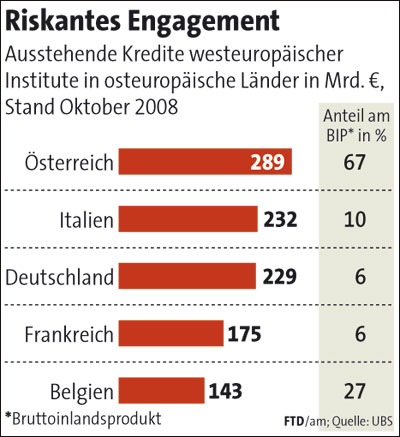
Die Schulden Österreichs machen 58% vom BIP aus (Quelle CIA World Fact Book). Garantien für 20% der Kredite nach Osteuropa auszugeben oder selbige 20% einfach durch den Staat aufzukaufen würde das mal gerade um 14% erhöhen, auf 72% Staatsverschuldung (nicht schön, aber erträglich). Dafür könnte man die Krise in Ruhe aussitzen - und der Staat, mit langem Atem und deutlich mehr Macht als jede Bank, könnte von den Ausfällen (bzw. den dahinter stehenden Werten) langfristig noch etwas zurück gewinnen, ohne daß sofort Kettenreaktionen einsetzen.
Die Zahl der erfassten Arbeitslosen in Russland hat per 11. Februar 1 807 600 betragen und ist somit seit September 2008 bereits um 1,1 Millionen angestiegen.
Wie Ministerin für Gesundheitswesen und Soziales, Tatjana Golikowa, am Mittwoch mitteilte, übertreffen die heutigen Zahlen die frühere Jahresprognose von 1,6 Millionen Arbeitslosen, auf deren Grundlage die Haushaltsbereitstellungen für das Arbeitslosengeld berechnet wurden, bereits um 200 000.
[...]
Wie der Vizeminister für Gesundheitswesen und Soziales Maxim Topilin seinerseits mitteilte, kann die Zahl der registrierten Arbeitslosen 2009 rund 2,2 Millionen betragen.
http://de.rian.ru/business/20090220/120237941.html
Hochrechnung:
September bis 11.2. (sagen wir mal 5 Monate): pro Monat 220000 neue Arbeitslose. Bis Ende des Jahres könnten das dann auch 4 Mio. sein. Wenn es bei 72000 pro Woche bleibt, dann auch 5 Millionen.
http://de.rian.ru/russia/20090220/120239944.html
Nach Schukows Worten haben mehr als 1000 Betriebe gemeldet, solche Beschäftigte zu haben. "Die Zahl solcher Beschäftigten hat per 11. Februar bereits 920 000 erreicht und somit in der letzten Woche um 100 000 zugenommen", sagte Schukow.
Wenn man die Kurzarbeiter und Zwangsurlauber bedenkt, dann könnten die Zahlen am Jahresende durchaus so oder gar schlimmer aussehen wie oben gesagt.
Ich bin ziemlich sicher, daß es eben nicht das ganze Jahr so weiter geht, und daß dieses Quartal das schlimmste Quartal der Krise sein wird (was nicht heißt, daß ich nicht glaube, daß es danach nicht weiter fällt - aber eben nicht so stark wie in diesem Quartal), aber für Nationen, die eine so stark im Ausland verschuldet sind wie Rußland und zu Spielbällen der Kapitalmärkte geworden sind, bin ich mir da nicht so sicher. Und eine im Grunde genommen arme Bevölkerung wie die Rußlands wird nicht ihre wenigen Ersparnisse für die Binnennachfrage stärkenden Konsum ausgeben.
Die Wahrscheinlichkeit, daß Rußland ein ganz, ganz grottenschlechtes Jahr haben wird, das ebenso fürchterlich wie die Zeit nach dem Zusammenbruch der UDSSR sein wird, ist mehr als 50%. Für die Junta Putin heißt das nicht Gutes - und ob der Mann ein lupenreiner Demokrat ist oder vielmehr ein gewaltbereiter Diktator, wird man dann sehen (falls man es nicht sowieso weiß).
Premier Putin verwies darauf, dass solche Bürger in eine komplizierte Situation gerieten, weil sie kein Arbeitslosengeld beanspruchen könnten.
Nur der Dokumentation wegen:
Zu den Aussichten nur so viel:
Saab fährt seit mehreren Jahren hohe Verluste ein. 2007 verbuchte der Konzern ein operatives Minus von 2,19 Mrd. schwedischen Kronen (201 Mio. Euro). Weltweit verkaufte Saab im vergangenen Jahr 93.295 Fahrzeuge, 25 Prozent weniger als 2007. Sie machten 1,1 Prozent am GM-Gesamtabsatz aus.
Das geht so nie auf. Erstens hat GM keine 400 Mio. übrig, zweitens wird Saab dieses Jahr deutlich mehr als nur 200 Mio. Miese machen.
Serbia is also negotiating for 510 million dollars in assistance from the European Union as well as 300 million dollars from the World Bank, Bajec said.
Also 3,3 Mrd. Nominelles BIP um die 50 Mrd. Dollar, ergo leihen die sich 6% des BIPs.
Im November hat sich Serbien noch einen 500 Mio. Kredit beschafft, als reine Vorsichtsmaßnahme ("We believe we will not need the money"), und dabei versprochen, das Haushaltsdefizit von 2.7 auf 1.5% zu senken...
... und nun sieht es so aus, als würde es eher auf 3% steigen.
Ich nehme ihnen das Defizit nicht weiter übel (was sind schon 3% verglichen mit dem Defizit der USA?). Nur ist das ein weiterer Hinweis darauf, daß noch im November alle Prognosen hoffnungslos geschönt waren, und auch der IWF keine Ahnung hatte, was kommen würde.
Im 4. Quartal wurde in Spanien mit dem Bau von 135 Häusern durch die G-14 Gruppe der größten Bauunternehmen begonnen.
Pedro Pérez, President of the G-14, estimates the new build housing inventory at 700,000 properties, though other sources claim that there are more than 1 million new homes on the market, mainly flats.
2006: 800000 Baubeginne.
2008: 250000
2009: 150000 (Vorhersage)
Das könnte sich, im Angesicht von 135 Baubeginnen im letzten Quartal, als etwas optimistisch erweisen, vor allem weil mindestens 700000, vielleicht über eine Million, _neue_ Häuser auf dem Markt sind.
120 Mio. Dollar sind nichts, heutzutage. Naja, weniger als nichts.
Aber das ist auch nicht der interessante Teil des Artikels, sondern:
The fund said it expected that remittances -- which according to its estimates account for 45 percent of the country's GDP -- could decline by 30 percent this year.
45% des BIP machen die Gelder aus, die im Ausland arbeitende Tadschiken nach Hause schicken. Und von denen Gelder sollen 30%, sprich 13.5% des BIP, ausbleiben...
Bitter, unzweifelhaft. Denn bei einem BIP vom 3,7 Mrd machen 13.5% etwa 500 Mio. aus. 120 Mio. vom IWF sind da ein Tropfen auf den heißen Stein.
Und es ist nicht so, daß der Inlandsanteil des BIPs unbedingt stabil bleiben muß:
The government has implemented an energy rationing scheme, leaving the country with severe energy shortages.
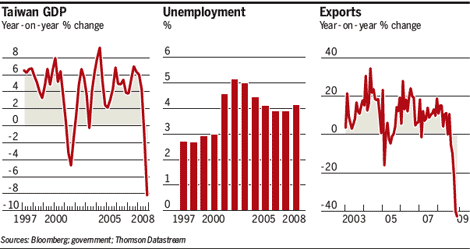
The Statistics Office don’t produce detailed information on the month by month movements in GDP, but using the raw data they do provide I have calculated the monthly growth rates, and have produced the chart below, which gives a pretty clear idea of what has been happening.
Bruttosozialprodukt:
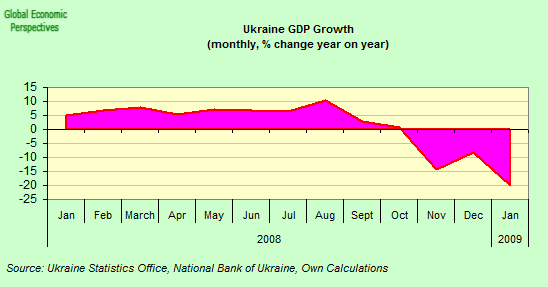
Industrieproduktion:
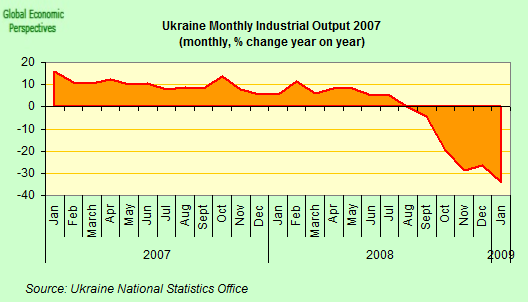
Naftogaz hat bereits Schulden von mehr als 3,2 Mrd. Euro. Die Europäische Bank für Wiederaufbau und Entwicklung (EBRD) kündigte an, die ukrainische Wirtschaft mit 1,3 Mrd. Euro zu unterstützen.
1.3 Mrd. sind nicht viel, wirklich nicht.
"Mehr billiges Geld" ist kein Rezept, irgendetwas _außer_ der Verschwendung effizienter zu machen.
Die Autoproduktion in Großbritannien ist im freien Fall:
The steep decline comes as car makers including Ford, Honda, Toyota, Nissan, BMW's Mini and Jaguar Land Rover cut production and jobs.
The data from the Society of Motor Manufacturers and Traders (SMMT) marks a further decline from December, when production fell by 47.5pc compared to a year earlier.
[...]
The figures, which also show a 59.9pc fall in the production of commercial vehicles, cap a pitiful week for the industry. On Monday, 850 jobs were cut at BMW's Mini factory near Oxford, prompting employees to pelt management with fruit. The following day GKN, which makes car parts, axed 564 jobs "entirely due to the dramatic and sustained reduction in customer orders".
http://ukhousebubble.blogspot.com/2009/02/crashing-uk-car-industry.html
Graphik aufbereitet von ukhousingbubble: Autoproduktion in .uk 2008, Quartal auf Quartal.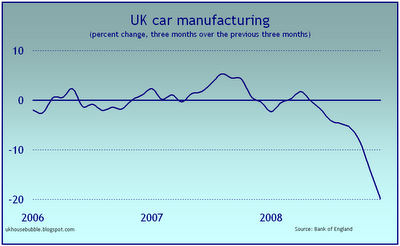
Die Geschwindigkeit des Absturzes wächst.
Das, was ein Land braucht, um eine schwere Wirtschaftskrise noch etwas schlimmer zu machen: Preisanstiege wegen Währungsverfall:
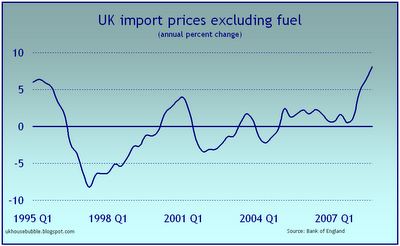
Sterling's recent collapse has done wonders for import price inflation. As of the third quarter of 2008, prices were up over 8 percent compared to a year earlier.
At least, the Bank of England should be happy. They are very anxious to keep inflation alive and well in the UK.
Der britische Staatsbetrieb Bradford & Bingley, ehemals eine unabhängige Hypothekenbank, verschiebt Zinszahlungen auf nachrangige Anleihen.
“It’s madness that the government can simply rewrite bond documentation,” said Richard Thomson, a credit analyst at Henderson Global Investors in London. “We are very disappointed. It’s bad news for Bradford & Bingley bondholders and it’s bad for the bank capital market.”
Ich halte das für einen extrem gefährlichen Schritt.
The changes may mean that credit-default swaps covering the debt may not be triggered if the bank defers interest payments, making the contracts worthless, Frieser said. Default swaps typically pay out if a borrower fails to meet debt obligations or is restructured.
Außerdem stellt sich damit auch die Frage, wie solvent Großbritannien eigentlich ist.
Die US- und UK-Rettungspakete im Verhältnis zum BIP:
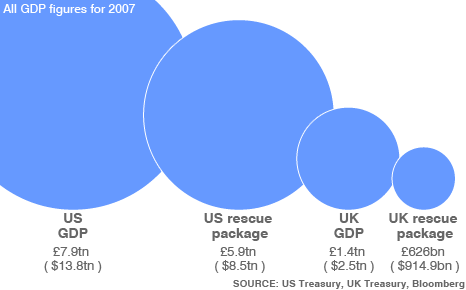
Das US-Rettungspaket im Verhältnis zu den (inflationsbereinigten) Kosten des Marshallplans:
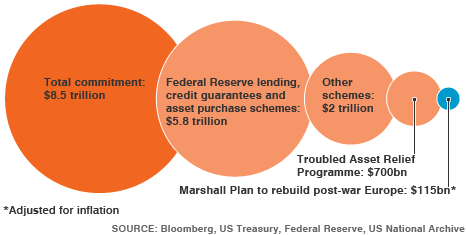
Under the plan adopted in principle by the governing board of the L.A. Department of Water and Power, homes and businesses would pay a penalty rate -- nearly double normal prices -- for any water they use in excess of a reduced monthly allowance.
[...]
The rationing scheme is expected to take effect in May unless the City Council acts before then to reject it -- a move seen as unlikely since Mayor Antonio Villaraigosa called for the measure under a water-shortage plan last week.
Das ist sicherlich ein guter Anfang,
That measure cut citywide water use by about 25 percent, DWP spokesman Joseph Ramallo said.
The DWP board also voted unanimously to restrict lawn sprinkler use to two days a week, as urged by the mayor. Outdoor irrigation accounts for 40 percent of residential water use in the city, DWP officials say.
aber warum sollten Rasensprenkler 2 Tage in der Woche laufen dürfen?
denn mir leuchtet nicht ganz ein, warum Rasensprenkler 15% der Zeit laufen dürfen, wenn die Landwirtschaft mit 15% des Wassers auskommen muß.

Quelle: oben verlinkter Artikel
Ein Update zu tarp: Der freie Fall der Wertpapiere, die an TARP oder ähnlichen Programmen teilnehmen, geht weiter:
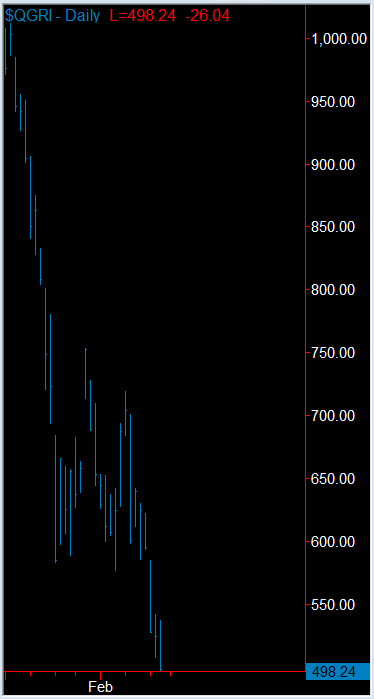
Eine naheliegende Deutung ist, daß die betroffenen "securities" seit Anfang Januar um 50% gefallen sind...

The ABI fell off a 2nd cliff in late 2008, and that will show up later in 2009.
This is just more evidence that non-residential investment in structures will decline sharply this year.
Die nächsten 12 Monaten werden in der US-Baubranche nicht wirklich lustig.
This puts that annual rate of decline over the last three months at an incredible 26.7 percent. The rate of capacity utilization in manufacturing is now 68.0 percent, far lower than at any point since 1987, when the current series began. This rate of utilization is almost certainly lower than the troughs of 1981-82 recession, and will certainly fall lower in the months ahead.
Auf ein Jahr hochgerechnet sank die Industrieproduktion der USA in den letzten 3 Monaten um 26.7%.
Dezember alleine: -2.9% (um 0.6% aka ein Viertel zum Schlechteren korrigiert).
Januar alleine: -2.5%

http://www.telegraph.co.uk/finance/alex/?cartoon=4686137&cc=4434268]Quelle
Warum die Verstaatlichung der Banken eine gute Idee ist? Bankiers denken nur an den nächsten Bonus, Politiker nur an die nächste Wahl - daher haben die das gemeinsame Interesse, bis dahin die Fassade nicht bröckeln zu lassen.
Leider habe ich das Gefühl, daß das die Zusammenarbeit von Finanzindustrie und Politik/Regulierern vor der Krise ganz gut beschreibt.
Schrieb' ich wirklich Verstaatlichung? Ich meinte natürlich Privatisierungsvorbereitung oder Vorprivatisierung.
Gruß, Uwe
Wollen Sie den Digest abbestellen?